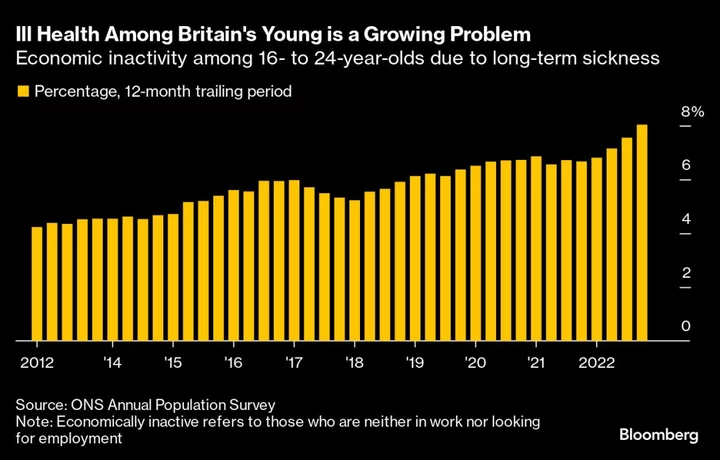The next generation of Britain’s workforce is set to receive exam results today that will determine their future plans. But for some, the twin crises of Covid-19 and the cost of living crisis have already left a mark on their career paths.
Students sitting their exams this year have already faced a deluge of bad news around their futures. A more lenient grading system introduced to compensate for exam cancellations during lockdown is predicted to mean a steep drop in the number of students getting top marks, heightening the risk of missing out on university places. New student loan terms also mean this will be the first generation where individuals are still paying off their student debt even after they retire.
The aftershocks of lockdown restrictions are also still being felt across schools, with absences roughly doubling since before the pandemic. At the same time, this group is increasingly suffering from mental health illness; a quarter of young people aged between 17 and 19 now have a probable mental health disorder, according to the NHS.
But these societal shifts have had a lopsided effect on different groups, often down the lines of their household income and social class. Young working class people, for example, are less likely to apply to university in the first place or say they’d fallen behind their peers compared to their classmates with parents in managerial or professional occupations, research from the Sutton Trust shows.
This has an impact; in addition to not obtaining valuable skills, those who decide not to go to university will earn an average of at least £100,000 less over their working lives than those who do, according to the Institute for Fiscal Studies.
Read More: Britain’s Youngest Workers Face a Bleak Economic Future
“The impact of the pandemic has been to reverse decades of progress,” in closing the attainment gap between children along lines of disadvantage, said Sarah Atkinson, CEO at the charity The Social Mobility Foundation. “It's also not good news economically — we're in a skills and productivity challenge as an economy so we mustn’t be wasting hard-working, aspirational young people.”
Both the main political parties have prioritized the question of how to revamp the UK’s flagging productivity and boost a skills shortage ahead of a general election that could take place as soon as next year. Prime Minister Rishi Sunak suggested making some form of maths compulsory for all schoolchildren until the age of 18 while and Labour Party Leader Keir Starmer said he would break the “class ceiling” in education and work and integrate communication skills into schools.
That might not be enough. “Both of those are good things,” said Atkinson but “they’re specific elements of what needs to be a much more big, coherent and ambitious plan.”
The university experience differs too
In the meantime, the cost of living crisis is squeezing families, putting pressure on the choices young people are making about their future. More than a third of students are considering living at home if they get into their preferred university, according to the Sutton Trust with University College London. That compares with about 20% of first year undergraduates in England living at home while studying before the pandemic
For a significant proportion, that’s down to money. “Our concern is cases where cost or related factors are driving this decision, which is likely to entrench existing inequalities between those from different socioeconomic groups,” the authors of the report said.
That’s partly because the most prestigious universities “are disproportionately in more advantaged areas,” said Jake Anders, the lead researcher for the project at University College London.
There’s rising concern that this is putting opportunities further out of reach for more disadvantaged children, an area that the UK lagged behind its peers, even before the pandemic. “The wider discourse on social mobility indicates that we are one of the developed countries in the world where there are lower rates of intergenerational mobility,” said Anders.
Both Tayaba Khan and Daniel, who didn’t want to give his surname to avoid judgment from his peers, are excited to for the new stage of starting university. But they have had to make significant adjustments to their education over the course of the pandemic and beyond.
During Covid-19 lockdowns, Daniel shared a bedroom with his young brother and had to find pockets of time to study in the middle of the night or at scattered times throughout the day while preparing for exams.
If Khan gets the grades to study medicine at Leeds University, she’s considering commuting the two hours from her family home on the outskirts of Manchester. She is considering the option of living in student accommodation instead if her course is more demanding but the prospect of managing that financially “really stressed me out,” she said. It would likely require her to work part-time.
Daniel, who plans to study Law and French at Warwick University, would also commute over an hour from Leicester if he gets a place, involving the train and the bus. As a student who’s settled in the UK as an EU immigrant, he isn’t entitled to a maintenance loan which would help to cover living costs. “I kind of have no choice,” he said.
For Jack Buckley, who hopes to study computer science at Oxford University, one of the main repercussions of the pandemic and the cost of living crisis has been maintaining the social life of a normal teenager. “Sixth form isn’t just about studying, it’s about going out and making mates and seeing people,” he said.
But as the price of everything from transport to the cinema has gone up, he and his friends are sometimes having to miss out. "I just don't have the money for it," he said.
Author: Olivia Konotey-Ahulu

